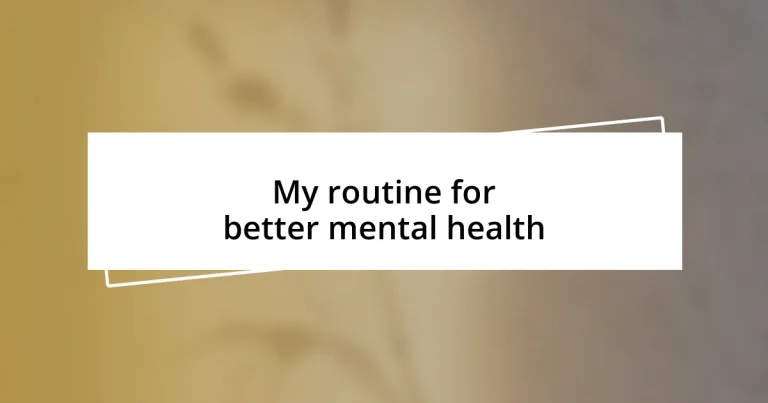Key takeaways:
- Mental health is essential for overall well-being, impacting relationships and productivity.
- Daily practices like mindfulness, gratitude journaling, and regular exercise significantly enhance mental wellness.
- Nutrition plays a critical role in mental health, with whole foods and hydration contributing to improved mood and focus.
- Creating a supportive environment through organization and meaningful connections fosters mental well-being.
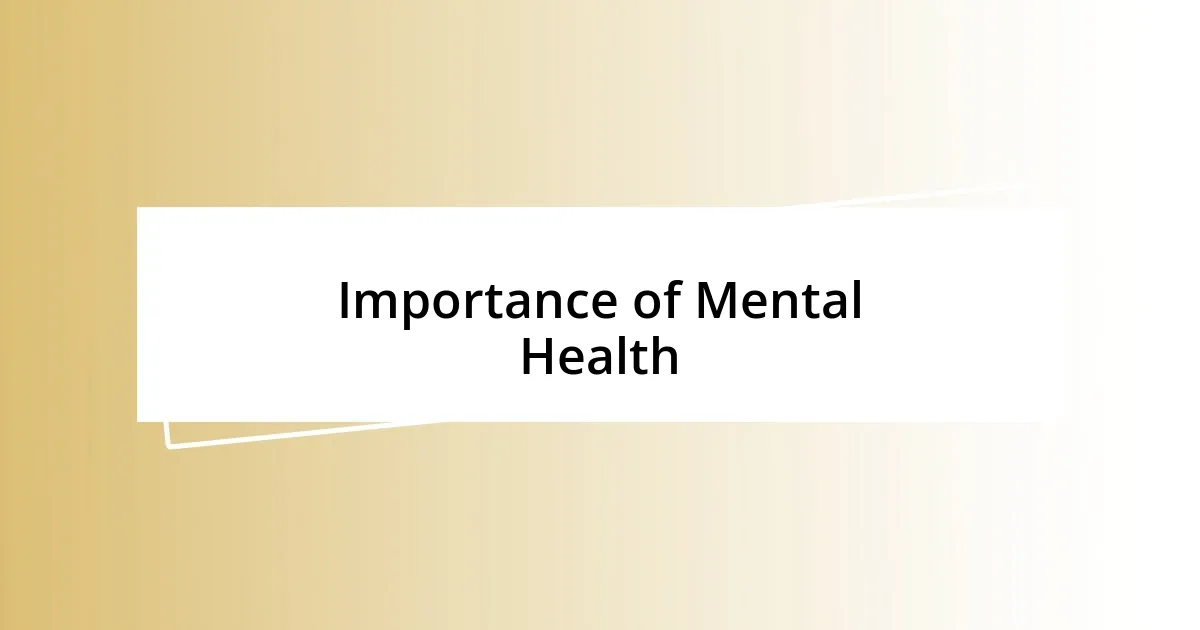
Importance of Mental Health
Mental health is foundational to overall well-being; it affects how we think, feel, and act in our daily lives. I’ve often wondered how much my mood can shift based solely on my mental health. Have you ever noticed how a single day of stress can ripple through your week?
When I faced a particularly challenging period in my life, I realized that taking care of my mental health wasn’t just important; it was essential. I found that putting effort into my mental well-being improved my relationships and productivity. It’s remarkable how addressing your mental health can have a cascading effect on everything around you.
The stigma surrounding mental health leads many to neglect it, but the truth is, prioritizing it opens doors to thriving lives and fulfilling experiences. I remember feeling ashamed to seek help, yet when I finally did, it was like lifting a weight off my shoulders. What if we all made our mental health a top priority? Imagine how much brighter our days could be.
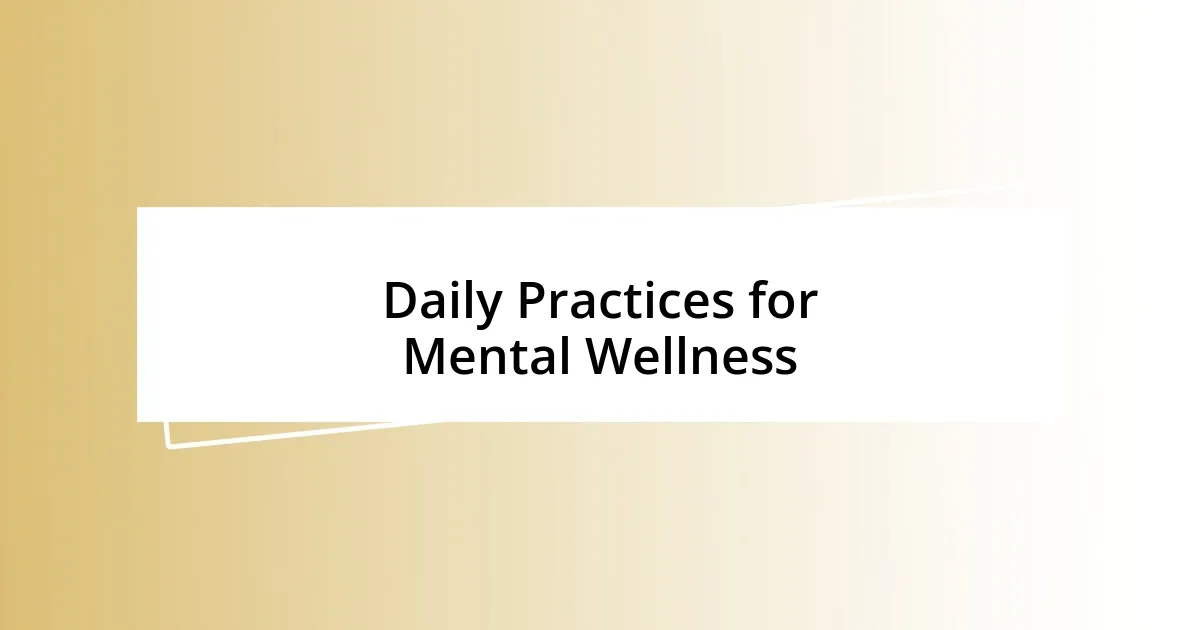
Daily Practices for Mental Wellness
Daily practices for mental wellness can really transform the way we navigate our lives. I’ve found that when I dedicate even a small part of my day to these practices, I feel more grounded and equipped to handle whatever comes my way. For instance, I’ve made it a habit to incorporate mindfulness into my morning routine. Just a few minutes of deep breathing or meditation can shift my mindset significantly.
Here are some effective daily practices to enhance mental wellness:
- Mindful Morning Rituals: Spend 5–10 minutes on meditation or deep breathing.
- Gratitude Journaling: Write down three things you’re grateful for each day to foster a positive mindset.
- Regular Physical Activity: Even a short walk can uplift your mood and clear your mind.
- Healthy Eating: Nourishing your body with balanced meals can impact your mental state.
- Disconnect to Reconnect: Limit screen time, especially before bed, to reduce anxiety levels.
- Set Boundaries for Self-Care: Make time for activities that you enjoy and that recharge you.
Incorporating these practices consistently has changed how I respond to stress. I remember when I started journaling; it felt awkward at first, but soon it became a safe space for my thoughts. Writing things down allowed me to process feelings that I didn’t even know were weighing me down. By sharing these moments and routines, I hope to encourage you to explore what resonates with you, because each small step can lead to significant change in your mental well-being.

Effective Stress Management Techniques
Stress can often feel overwhelming, but I’ve learned that effective management techniques can make a significant difference. One technique that resonates with me is progressive muscle relaxation. In moments of stress, I take time to consciously relax each muscle group, starting from my toes and moving to the top of my head. This not only alleviates physical tension but also calms my racing thoughts. Have you ever felt the weight of stress lifting as you focus on your body’s sensations? It’s a practice I wish I had discovered sooner.
Another approach I’ve found particularly effective is maintaining a structured routine. Establishing a daily schedule helps create predictability in my life, which can be incredibly comforting during times of uncertainty. I’ve noticed that when I plan my day, setting aside specific times for work, self-care, and relaxation, I’m less reactive to stressors. It’s like giving myself a roadmap to follow; when unexpected challenges arise, I can pivot more easily without losing my overall direction.
Venturing into nature has also proven to be a powerful stress reliever for me. I frequently take short hikes or walks in nearby parks. I’ve always felt an immediate sense of peace when surrounded by greenery. There’s something about the fresh air and natural surroundings that rejuvenates my spirit. If you haven’t tried it yet, I highly encourage stepping outside, even for just a few minutes. You might be surprised by how it shifts your perspective.
| Technique | Description |
|---|---|
| Progressive Muscle Relaxation | A method of reducing stress by consciously tensing and relaxing each muscle group, promoting physical and mental calm. |
| Structured Routine | Establishing a daily schedule to create predictability, which helps manage anxiety and stress responses. |
| Nature Walks | Spending time outdoors to connect with nature, which can enhance mood and reduce feelings of stress. |

Mindfulness and Meditation Benefits
Mindfulness and meditation have truly shaped my approach to mental well-being. I remember one particular moment when I was overwhelmed with tasks, and just five minutes of focused breathing transformed my state of mind. It’s as if the noise around me faded, allowing clarity to take its place. Have you ever experienced a moment of unexpected calm when focusing on your breath?
Engaging in mindfulness helps me remain present, particularly during stressful situations. When I meditate regularly, I notice a remarkable difference in my ability to handle life’s curveballs. During my workday, pausing to practice mindfulness reminds me that I’m in control of my reactions, rather than being swept away by anxiety. This shift in perspective is empowering, don’t you think?
Additionally, I’ve found that mindfulness allows my thoughts to flow more freely. Sometimes, when I’m journaling post-meditation, ideas seem to emerge effortlessly, unlocking creativity I didn’t realize was there. It’s fascinating how a quiet mind can yield such profound insights! By creating space for reflection, I invite growth and understanding into my daily life, which makes every meditation session feel well worth the effort.
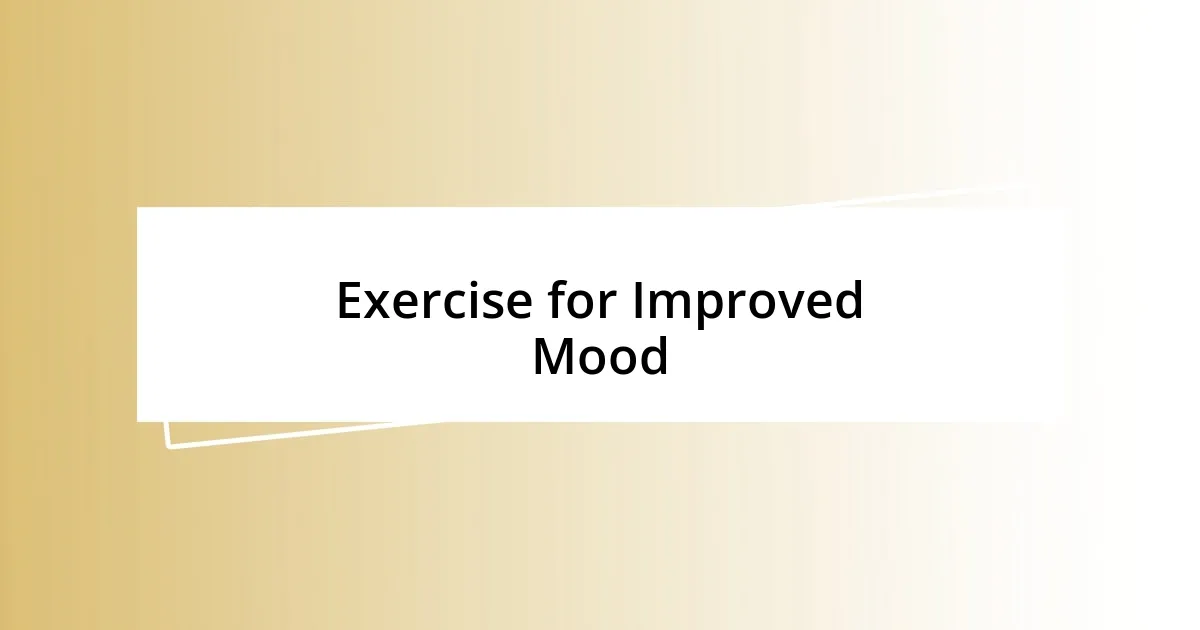
Exercise for Improved Mood
Incorporating exercise into my daily routine has been a game changer for my mood. On days when I push myself to get moving, whether it’s a quick jog or a dance session in my living room, I often feel an exhilarating rush afterward. Have you ever noticed how a good workout can lift your spirits almost instantly? It’s as if the endorphins—those feel-good hormones—are nature’s little gift, making the world seem a bit brighter.
I’ve also realized that exercising outdoors adds an entirely different layer of enjoyment. Recently, I decided to try hiking, and the combination of physical activity and breathtaking views gave me a sense of freedom I hadn’t experienced in a while. It’s not just about the exertion; it’s the way nature’s beauty can refresh my mind and soul. Have you ever walked through a park and felt your worries slip away with each step? Those moments remind me that the great outdoors is not just a backdrop but a crucial part of my mental health toolbox.
Furthermore, I’ve found that joining group fitness classes brings a sense of community that enhances my mood even more. Being surrounded by people who share similar goals creates an encouraging atmosphere. I remember one class where we all cheered each other on, and I left feeling not just physically empowered, but emotionally connected. What about you? Have you ever felt that spark of camaraderie during a workout? Those shared moments can truly amplify the positive impact of exercise on our mental well-being.
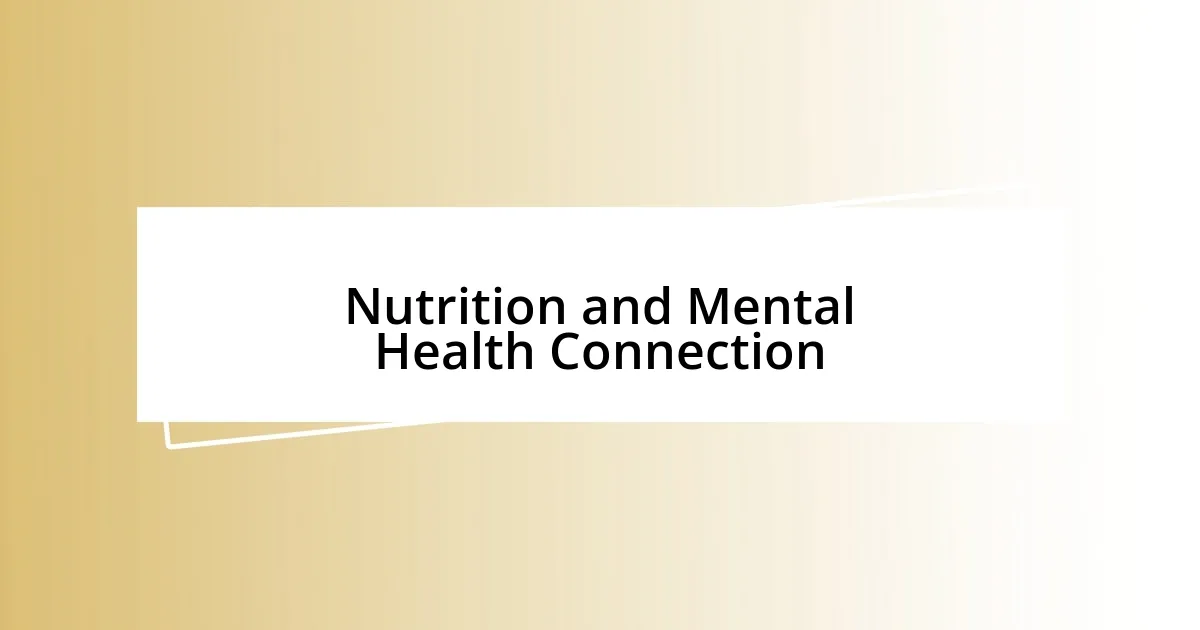
Nutrition and Mental Health Connection
Nutrition plays a vital role in our mental health, and I’ve experienced its effects firsthand. I remember a period when I was neglecting my diet, relying on quick snacks and caffeine to get me through the day. It wasn’t long before I noticed my mood plummeting. Have you ever felt that energy slump after a poor meal choice? It’s so clear now how what we consume directly influences our mental state.
In my own journey, incorporating more whole foods into my diet has made a world of difference. I started meal prepping vibrant salads packed with greens, nuts, and colorful vegetables, and I genuinely felt more energized and focused afterward. It’s fascinating to think about how nutrients like omega-3 fatty acids, found in fish and flaxseeds, can boost brain health. Isn’t it incredible how something as simple as a meal can elevate our mental well-being?
Moreover, I’ve noticed that staying hydrated is often overlooked but equally important. On days when I consciously drink enough water, I feel sharper and less anxious. I recall one particularly stressful week; I made it a point to drink herbal teas throughout the day, and it seemed to calm my mind during moments of overwhelm. Have you ever experienced the refreshing clarity that comes from just being well-hydrated? It’s a little reminder that even the smallest changes in our nutrition can lead to significant shifts in our mental outlook.

Creating a Supportive Environment
Creating a supportive environment is crucial for nurturing mental well-being. I remember when I first moved into my own space; the clutter and disarray felt overwhelming. It was during those moments that I realized how a tidy and organized environment could drastically improve my mood. Have you ever walked into a room that felt chaotic and left you feeling unsettled? Taking the time to declutter and arrange my surroundings has made my space feel like a safe haven, allowing me to think more clearly and focus on self-care.
Beyond just tidiness, I’ve learned that surrounding myself with uplifting influences is vital. I made a conscious decision to keep meaningful photos, motivational quotes, and plants in my living space. The greenery, in particular, has a way of bringing life and tranquility to my environment. How many times have you been uplifted just by gazing at a beautiful plant? I often find myself pausing to appreciate their growth, which reminds me that, just like them, I too can flourish in a nurturing space.
Additionally, I believe that fostering connections with supportive people is foundational to a healthy environment. A few close friends and I hold regular meetups, not just for fun, but to share our struggles and triumphs. It’s powerful to have those honest conversations; they make me feel less isolated and more understood. Have you ever felt a weight lift off your shoulders after sharing your feelings with someone? Those moments of vulnerability bring us closer, creating a network of support that’s essential for navigating life’s challenges.












